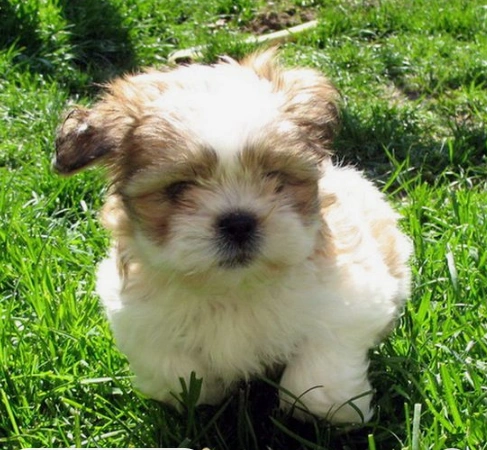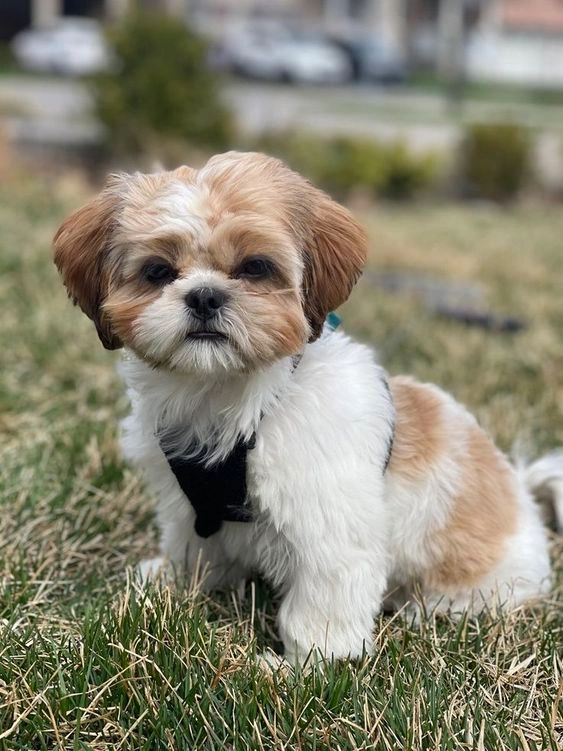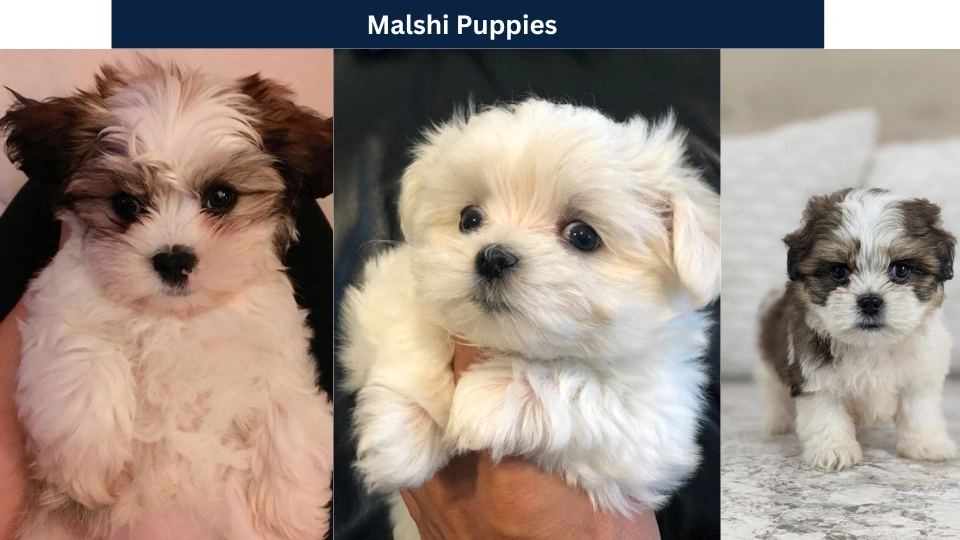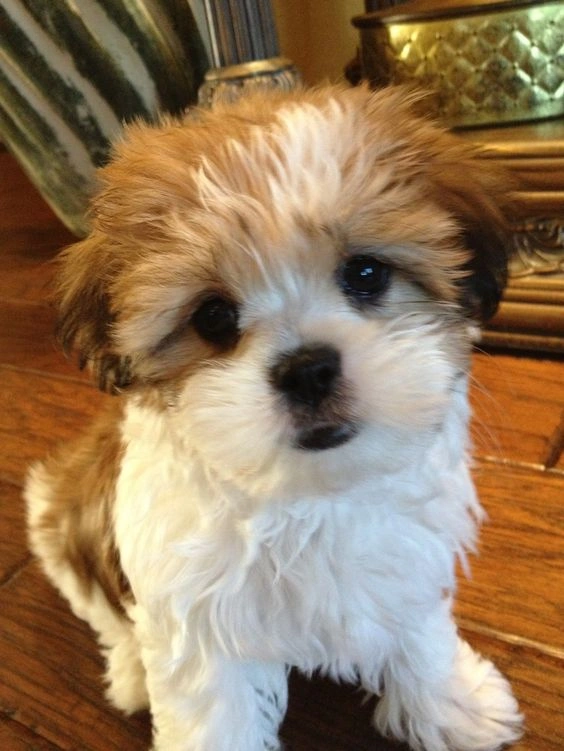Last Updated on March 12, 2024 by Aftab Tariq
Malshi puppies are a mix of Maltese and Shih Tzu parents, bringing together two beloved toy breeds. While not recognized by the American Kennel Club (AKC), we can understand them by studying their parent breeds.

The Shih Tzu got its name from the Mandarin word meaning “lion dog.” While its ancestors lived as royal pets in Chinese palaces, the breed is known for being playful and very friendly. The Maltese also has an impressive history, being cherished by ancient Greeks and Romans. Their breed standard describes them as gentle and well-mannered.
Malshi puppies, having parents like these, are usually playful, affectionate, and outgoing when they’re socialized and trained properly.
Personality and Temperament

Malshi puppies are small but smart and loving. They can easily adapt to different environments because of their size, but they can get hurt if they’re around small kids or big dogs. Also, Malshis might be cautious around people they don’t know.
These puppies have moderate energy levels. They need short walks and time to play every day. They love being close to their owners and enjoy sitting on their laps.
Malshi Behavior
Malshi puppies love their families and enjoy being around them all the time. If they’re left alone for too long, they can feel bored or anxious, which might make them bark a lot, chew things, or have accidents in the house. It’s important to give Malshi puppies plenty of attention and not leave them alone for too long.
Malshi dogs are happy in apartments if they get daily walks and playtime.
Health Issues
Maltese and Shih Tzu dogs are usually healthy and live a long time, around 12 to 15 years for Maltese and 10 to 18 years for Shih Tzu. Malshi puppies, being a mix of these two breeds, also tend to live for a similar amount of time.
However, just like any other dogs, Maltese and Shih Tzu can have health problems that they might pass on to their puppies.
Patellar Luxation
Malshi puppies, like other small dog breeds, can sometimes have a condition called patellar luxation. This happens when their kneecap moves out of its usual spot.
It’s more common in breeds like Maltese and Shih Tzu. Sometimes, it might not cause much trouble, but in severe cases, they might need surgery.
You can tell if a Malshi puppy has patellar luxation if you see them limping or hopping like a bunny. Sometimes, you might even hear a popping or cracking sound when they move their knees.
Periodontal Disease
Malshi puppies, like many small dog breeds, can develop a dental disease called periodontal disease. It happens when bacteria build up in their mouth and hurt their gums, teeth, and nearby bone. This problem is common in dogs, but smaller breeds like Maltese and Shih Tzu are at higher risk.
You can tell if a Malshi puppy has periodontal disease if their gums look red and swollen, and their breath smells bad. In severe cases, their teeth might even fall out or show roots.
To keep your Malshi puppy’s teeth healthy, it’s essential to brush them regularly, at least three times a week. You can also use special water or dental treats to help clean their teeth. It’s also important to take them to the vet for regular dental check-ups and cleanings.
Portosystemic (Liver) Shunts
A liver shunt is when there’s a strange blood vessel that lets blood from the stomach and intestines go straight into the body’s blood system without going through the liver. Normally, the liver cleans the blood, but with a shunt, this doesn’t happen. This can affect how the body works, including the brain and nerves.
Symptoms of a portosystemic shunt include:
- Losing weight
- Not growing well
- Not wanting to eat or eating strange things
- Having trouble peeing or seeing blood in their pee
- Drinking and peeing a lot
- Diarrhea
- Vomiting
- Having seizures
- Acting differently, like seeming tired, staring blankly, or having trouble seeing or moving
How to treat it depends on how bad it is. Some dogs might need surgery, while others might just need medicine or a different diet.
Hip Dysplasia
Hip dysplasia is when the hip joint doesn’t grow right, causing it to be unstable. This can lead to arthritis. Malshi puppies can inherit this condition from their parent breeds.
Typical symptoms of hip dysplasia are:
- Shifting of weight to front legs
- Hip pain
- Reluctance to rise or jump onto furniture
- Loss of muscle mass in the back legs
- Limping
Treatment for mild cases may include physical therapy and anti-inflammatory drugs, while severe cases may require surgery.
Eye Problems
Shih Tzu dogs often have eye problems that their Malshi puppies might also have.
Brachycephalic Syndrome
When it comes to feeding Malshi puppies, there isn’t a single perfect diet for every dog. It’s important to collaborate with your vet to create a feeding routine tailored to your pup’s specific needs, taking into account factors like age, size, and overall health.
How Much to Feed a Malshi?
When you look at the food bag for your Malshi puppy, you’ll find a guide telling you how much to feed them based on their weight. But for exact advice, it’s best to talk to your vet.
Your vet will consider your Malshi’s weight, how they look, how active they are, and any health issues when deciding how much food they need. Don’t forget to count treats in their daily calories too.
How To Feed a Malshi?
Malshi puppies should eat often, about three or four times each day, to prevent low blood sugar. When Malshis grow up, they can eat less often, usually two or three times daily. Your vet can guide you in deciding how often to feed your dog based on their age.
This feeding schedule is similar for Maltipoo puppies, another small breed known for its playful and affectionate nature.
Nutritional Tips for a Malshi
For Malshi puppies, it’s important to provide them with a diet that’s balanced and approved by the Association of American Feed Control Officials (AAFCO). If their food meets these standards, they usually don’t need any extra supplements or additions.
Sometimes, supplements or special diets are suggested by vets to address specific health concerns. Since Malshis may be prone to dental issues, like periodontal disease, vets might suggest dental chews as a preventive measure alongside regular brushing.
Always consult with your vet before introducing anything new to your Malshi’s diet, including supplements or special foods.
Training Tips for Malshi Puppies
Training Malshi dogs is vital for their well-being. Use positive reinforcement techniques and start early. Keep them mentally stimulated with toys and activities to prevent boredom and unwanted behavior.
Training
When Malshi puppies are born, they start learning how to interact with people and other animals. This learning period is very important and lasts until they’re about 16 weeks old.
If you’re getting a Malshi puppy, talk to the breeder about how they help the puppies learn to socialize. It’s important for pet parents to keep socializing their Malshi puppy after bringing them home.
Malshi puppies are clever and like to make their own choices sometimes. But all dogs, including Malshis, respond well to consistent, positive training. This means using rewards to encourage good behavior instead of punishment.
Positive training not only strengthens the bond between you and your dog but also keeps them mentally and physically active. This training approach is also effective for Maltese puppies, known for their gentle and affectionate demeanor.
Entertaining Activities
- Neighborhood walks
- Indoor or outdoor play
- Skills training
- Obedience training
Grooming Guide
Malshi puppies inherit their coats from both parents, who have stunning and often hypoallergenic fur. While no dog is completely hypoallergenic, Malshi pups shed very little, making them suitable for some people with allergies to dogs.
Ear Care
Shih Tzu dogs often have floppy ears and hair that grows inside the ear canal, which can lead to ear infections. This can also be true for Malshi puppies, depending on their ear structure.
Your vet can advise you on how to clean your puppy’s ears and how often. They’ll also let you know if the hair inside the ear needs to be removed.
If you notice any signs of infection, like redness, bad smell, pain, or itching, it’s important to take your puppy to the vet for treatment.
Coat Care
Your Malshi puppy will need regular grooming to keep their coat looking nice. This means brushing their fur every day and taking them to the groomer regularly.
Choosing a shorter haircut, like the “teddy bear” cut, can make it easier for you to brush them at home.
Skin Care
Taking care of your Malshi puppy’s coat is important for keeping their skin healthy. Matted fur can trap things like moisture and dirt next to their skin, so it’s important to keep their hair free from tangles.
Ask your vet how often you should give your Malshi a bath. Remember, bathing them too frequently can remove natural oils from their skin and make it dry and itchy.
Eye Care
Because of their Shih Tzu background, Malshi puppies are more likely to have eye problems. It’s important to check their eyes often for any issues, like cloudiness or redness.
Trimming the hair around their eyes can help prevent irritation and keep their eyes healthy.
Malshi Puppies for Sale Worldwide
Malshi puppies, sought after by dog lovers globally, are available for sale worldwide. These adorable companions bring joy to homes across the globe.
- Malshi Puppies for Sale Ohio
- Malshi Puppies for Sale Craigslist
- Malshi Puppies for Sale MN
- Malshi Puppies for Sale Manchester
- Malshi Puppies for Sale Glasgow
- Malshi Puppies for Sale London
Pros and Cons
Malshi Pros and Cons can help you make an informed decision about this breed.
To learn more about pets, read our article on Harpersatelier.
Frequently Asked Questions
Is a Malshi a good dog, especially considering the Malshi puppies price?
The Malshi breed needs early and continuous socialization with both humans and other dogs to feel comfortable. They’re known for being playful and loving, but because they’re small and delicate, they’re better suited for families with older, responsible kids. Malshis often form strong bonds with one person.
What are the best places to find Malshi puppies for adoption?
You can find Malshi puppies for adoption at local animal shelters, rescue organizations, or through online adoption websites. Additionally, you may also find them through breed-specific rescue groups or by contacting reputable breeders who may have Malshi puppies available for adoption.
sources
I am a dedicated content writer with more than five years of experience, particularly skilled in the art of storytelling. My writing journey commenced during my college years, where I pursued journalism and unearthed my talent for creating captivating narratives.



